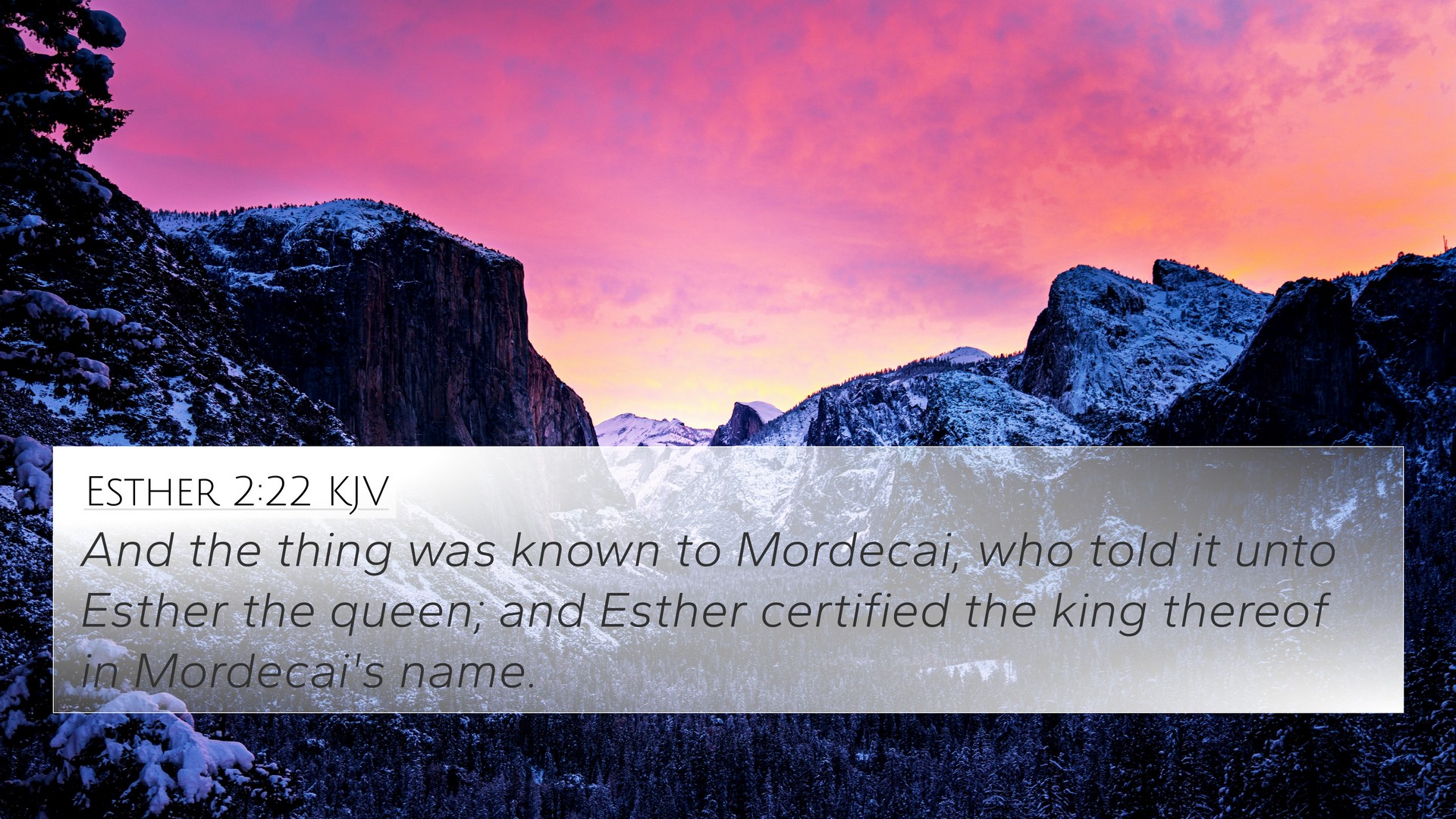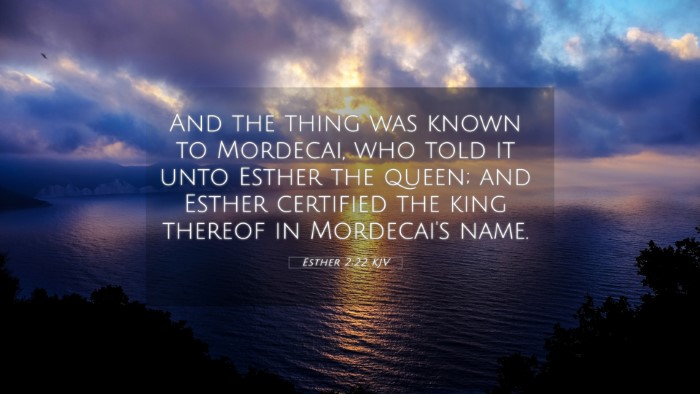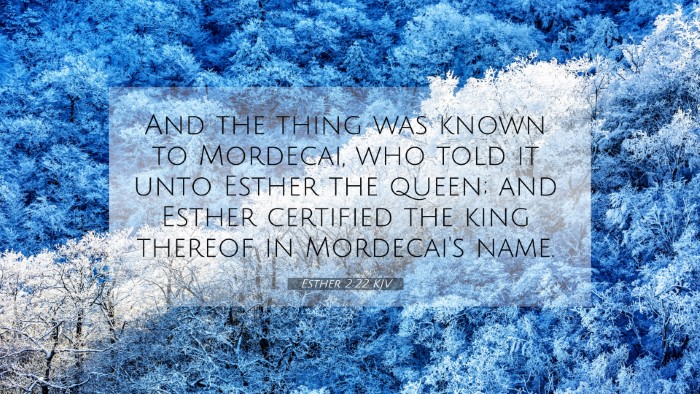Old Testament
Genesis Exodus Leviticus Numbers Deuteronomy Joshua Judges Ruth 1 Samuel 2 Samuel 1 Kings 2 Kings 1 Chronicles 2 Chronicles Ezra Nehemiah Esther Job Psalms Proverbs Ecclesiastes Song of Solomon Isaiah Jeremiah Lamentations Ezekiel Daniel Hosea Joel Amos Obadiah Jonah Micah Nahum Habakkuk Zephaniah Haggai Zechariah MalachiEsther 2:22 Similar Verses
Esther 2:22 Cross References
And the thing was known to Mordecai, who told it unto Esther the queen; and Esther certified the king thereof in Mordecai's name.
Uncover the Rich Themes and Topics of This Bible Verse
Listed below are the Bible themes associated with Esther 2:22. We invite you to explore each theme to gain deeper insights into the Scriptures.
Esther 2:22 Cross Reference Verses
This section features a detailed cross-reference designed to enrich your understanding of the Scriptures. Below, you will find carefully selected verses that echo the themes and teachings related to Esther 2:22 KJV. Click on any image to explore detailed analyses of related Bible verses and uncover deeper theological insights.
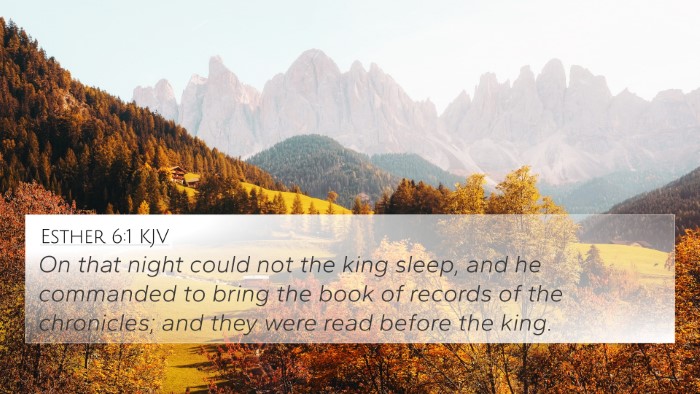
Esther 6:1 (KJV) »
On that night could not the king sleep, and he commanded to bring the book of records of the chronicles; and they were read before the king.
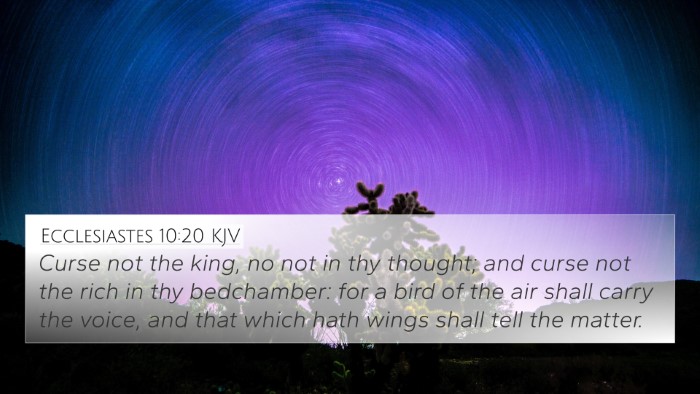
Ecclesiastes 10:20 (KJV) »
Curse not the king, no not in thy thought; and curse not the rich in thy bedchamber: for a bird of the air shall carry the voice, and that which hath wings shall tell the matter.
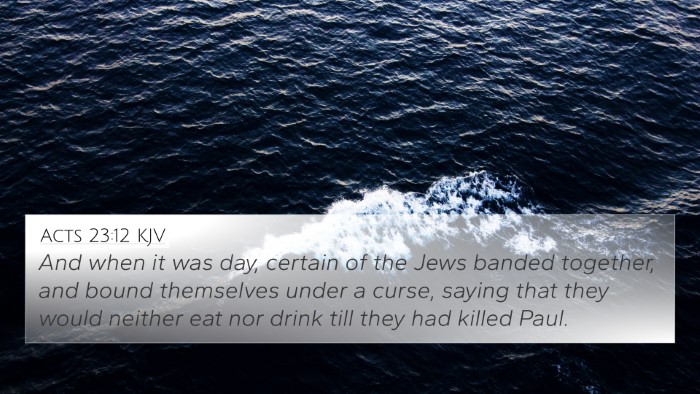
Acts 23:12 (KJV) »
And when it was day, certain of the Jews banded together, and bound themselves under a curse, saying that they would neither eat nor drink till they had killed Paul.
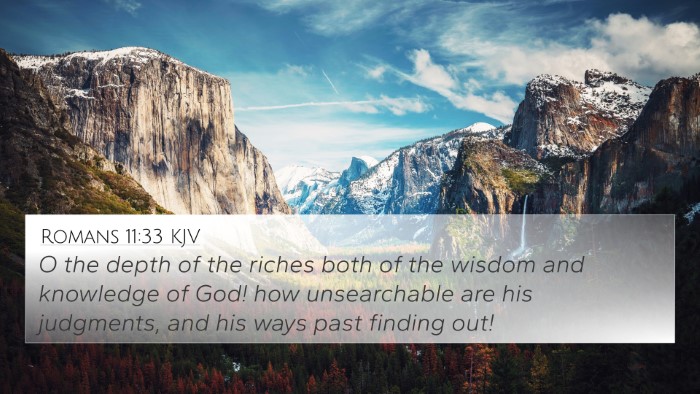
Romans 11:33 (KJV) »
O the depth of the riches both of the wisdom and knowledge of God! how unsearchable are his judgments, and his ways past finding out!
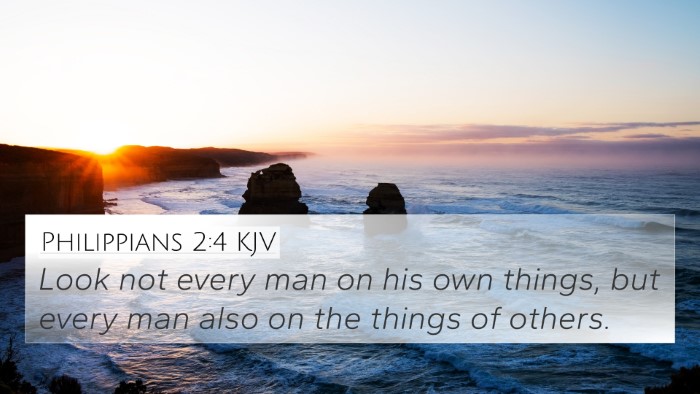
Philippians 2:4 (KJV) »
Look not every man on his own things, but every man also on the things of others.
Esther 2:22 Verse Analysis and Similar Verses
Understanding Esther 2:22
Verse: "And the thing was known to Mordecai, who told it unto Esther the queen; and Esther certified the king thereof in Mordecai's name."
Overview of Esther 2:22
Esther 2:22 presents a pivotal moment in the narrative of Esther, where Mordecai uncovers a plot against King Ahasuerus. His timely action and communication with Esther highlight themes of loyalty, justice, and providence in the broader story of the Jewish people in exile.
Commentary Insights
-
Matthew Henry:
Henry notes the importance of Mordecai's role in the unfolding events. His act of revealing the plot not only saves the king but also paves the way for future events that lead to the salvation of the Jewish people. This points to God's providential hand guiding the destiny of His people.
-
Albert Barnes:
Barnes emphasizes the significance of communication in this passage. Esther's willingness to relay information to the king through Mordecai illustrates the bond of trust between them and underscores the strength of their partnership in facing adversity.
-
Adam Clarke:
Clarke references the political and social dynamics at play. This incident reflects the loyalty required in a court setting and serves as a reminder of the responsibility individuals hold in serving justice and truth, even within perilous circumstances.
Thematic Connections
This verse invites exploration of several key themes in scripture:
- Loyalty and Trust: Mordecai's loyalty to the king and Esther, as well as Esther's trust in Mordecai, serve as foundational elements in their narrative.
- Divine Providence: The underlying belief that God orchestrates events for His purposes is evident throughout the book, exemplified by this act of revelation that alters the course of history.
- Justice: The pursuit of justice is paramount as Mordecai acts to protect the king from the assassination attempt, demonstrating that righteousness is essential in leadership.
Bible Verse Cross-References
Several verses can be connected with Esther 2:22 through themes of loyalty, divine protection, and justice:
- Proverbs 21:1: "The king's heart is in the hand of the Lord, as the rivers of water: he turneth it whithersoever he will."
- 1 Samuel 16:7: "But the Lord said unto Samuel, Look not on his countenance, or on the height of his stature; because I have refused him: for the Lord seeth not as man seeth; for man looketh on the outward appearance, but the Lord looketh on the heart."
- Psalms 37:25: "I have been young, and now am old; yet have I not seen the righteous forsaken, nor his seed begging bread."
- Proverbs 12:22: "Lying lips are abomination to the Lord: but they that deal truly are his delight."
- Jeremiah 29:11: "For I know the thoughts that I think toward you, saith the Lord, thoughts of peace, and not of evil, to give you an expected end."
- Romans 8:28: "And we know that all things work together for good to them that love God, to them who are the called according to his purpose."
- James 5:16: "Confess your faults one to another, and pray one for another, that ye may be healed. The effectual fervent prayer of a righteous man availeth much."
Connecting Esther 2:22 with Other Scriptural Texts
The inter-Biblical dialogue within this passage highlights effective cross-referencing methods:
- Significance of Names: Esther's act of revealing information under Mordecai’s name reflects the theme of interdependence found in Romans 12:5, where members of the body of Christ work together.
- Justice Themes: Similar motifs of revealing plots and protecting the innocent can be found in Exodus 23:7
- Friendship and Loyalty: The relationship between Mordecai and Esther resonates with John 15:13, highlighting the idea of laying down one's life for friends, albeit in a different cultural context.
Utilizing Bible Reference Resources
For deeper understanding, tools for Bible cross-referencing such as concordances, topical studies, and commentaries can enhance your study.
- Explore a Bible concordance to find related keywords and themes across different scriptures.
- Use a cross-reference Bible study guide to understand the links between varying verses.
- Engage in comprehensive Bible cross-reference methods that emphasize thematic connections across Testaments.
Conclusion
Esther 2:22 richly demonstrates the interconnectedness of the biblical narrative. By examining cross-references and exploring thematic connections, one enhances their understanding of the intricate dialogue present within scripture. This verse not only illuminates the lives of its characters but also engages readers in the broader tapestry of God's providential narrative.
